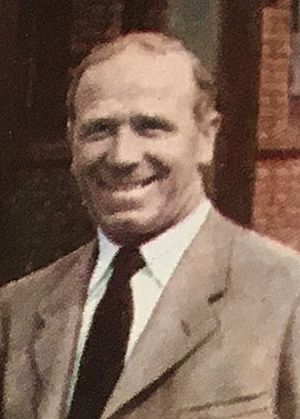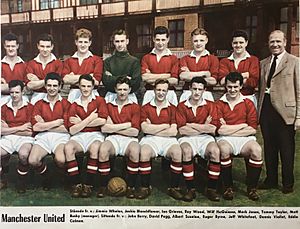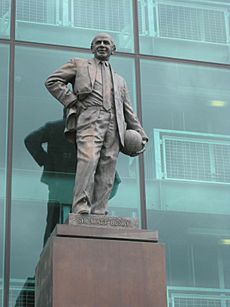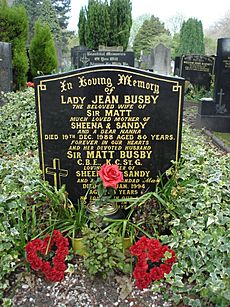Matt Busby facts for kids

Busby in 1957
|
|||
| Personal information | |||
|---|---|---|---|
| Full name | Alexander Matthew Busby | ||
| Date of birth | 26 May 1909 | ||
| Place of birth | Orbiston, Bellshill, Scotland | ||
| Date of death | 20 January 1994 (aged 84) | ||
| Place of death | Cheadle, Greater Manchester, England | ||
| Height | 1.78 m (5 ft 10 in) | ||
| Position(s) | Right half, inside forward | ||
| Senior career* | |||
| Years | Team | Apps | (Gls) |
| 1928 | Denny Hibs | ||
| 1928–1936 | Manchester City | 204 | (11) |
| 1936–1945 | Liverpool | 115 | (3) |
| 1941–1943 | → Hibernian (guest) | 0 | (0) |
| Total | 319 | (14) | |
| International career | |||
| 1933 | Scotland | 1 | (0) |
| 1941 | Scottish League XI | 1 | (0) |
| 1942–1945 | Scotland (wartime) | 7 | (0) |
| Managerial career | |||
| 1945–1969 | Manchester United | ||
| 1948 | Great Britain | ||
| 1958 | Scotland | ||
| 1970–1971 | Manchester United | ||
| *Club domestic league appearances and goals | |||
Sir Alexander Matthew Busby (26 May 1909 – 20 January 1994) was a famous Scottish football player and manager. He is best known for managing Manchester United for many years, from 1945 to 1969, and again briefly in 1970–71. He was the first manager of an English team to win the European Cup, which is a huge achievement in football. Many people think he was one of the greatest football managers ever.
Before he became a manager, Busby played for two big rival teams of Manchester United: Manchester City and Liverpool. While playing for Manchester City, he reached two FA Cup finals and won one. His playing career was stopped by World War II. After the war, he wanted to be a coach at Liverpool, but they didn't give him the control he wanted over the team. So, he decided to join Manchester United instead. There, he built the famous "Busby Babes" team. Sadly, eight of these young players died in the Munich air disaster. But Busby bravely rebuilt the team, and a decade later, Manchester United won the European Cup. In his 25 years with the club, he helped them win 13 trophies.
Contents
Early Life and Football Dreams
Matt Busby was born on May 26, 1909, in a small mining village called Orbiston, in Bellshill, Scotland. His father, Alexander, was a miner who fought in World War I and sadly died in 1917 during the Battle of Arras. Matt's mother, Helen, raised him and his three sisters by herself for a few years. Later, she married Harry Matthie in 1919.
Matt grew up as a Catholic and went to Our Lady's High School, Motherwell. In 1972, he was honored by Pope Paul VI. Four years before that, he had been made a Knight Bachelor by the Queen. Matt loved football from a young age. He often went with his father to the coal mines, but his real dream was to become a professional footballer.
In the late 1920s, his mother planned for them to move to the United States. However, the process took nine months, which gave Matt a chance to pursue his football dream. During this time, he worked as a coal miner and played football part-time for a junior team called Denny Hibs. He didn't play many games for them before he was signed by Manchester City.
Playing Career Highlights
Playing for Manchester City
Matt Busby joined Manchester City on February 11, 1928, when he was 18. He signed a one-year contract for £5 per week. He could have left to go to the United States with his mother, but he chose to stay. He played his first game for City on November 2, 1929, as an inside left. City won that game 3–1 against Middlesbrough. That season, he played 11 more games and scored five goals.
In the 1930–31 season, City's manager, Peter Hodge, decided that Busby would be better as a right-half. In this new role, Busby became known as a smart player and a great passer. In 1930, Manchester United tried to sign him, but they couldn't afford the £150 fee City wanted. By the 1931–32 season, Busby was a key player, missing only one match. He and Jackie Bray were so good as wing-halves that their captain, Jimmy McMullan, had to play as a forward to stay in the team.
In the 1930s, Manchester City did very well in the FA Cup. They reached the semi-finals in 1932 and the final in 1933. They finally won the tournament in 1934. However, by the end of the 1934–35 season, Busby played less often. On March 12, 1936, he was sold to Liverpool for £8,000. He had played over 200 games for Manchester City.
Playing for Liverpool
Busby made his debut for Liverpool just two days after signing, on March 14, 1936. The game was against Huddersfield Town and Liverpool lost 1–0. A month later, he scored his first goal for Liverpool in a 2–2 draw against Blackburn Rovers. He quickly became a regular player, rarely missing a game for the next three seasons.
His consistent play earned him the captaincy of Liverpool. He led the club with great skill. Many people believe that Busby, along with Jimmy McDougall and Tom Bradshaw, formed one of the best half-back lines Liverpool ever had.
In 1939, Bob Paisley joined Liverpool. Busby took him under his wing and taught him a lot about the club. This led to a lifelong friendship between them. Both would later become very successful managers in English football. The Second World War soon began, which ended Busby's playing career. Like many Liverpool players, he joined the King's Liverpool Regiment for national service.
Playing During the War
Even during the war, Busby continued to play football. He played for several clubs as a "guest player." These included Chelsea, Middlesbrough, Reading, Brentford, and Bournemouth & Boscombe Athletic.
In 1941, Hibernian in Scotland brought Busby back north. He played 37 matches for them and scored five goals. He even played in two Summer Cup finals against Rangers, winning one in 1941. After returning to Liverpool, he became an assistant coach in May 1944.
International Matches
Busby played only one official international game for Scotland. This was on October 4, 1933, in a 3–2 loss to Wales. His future assistant, Jimmy Murphy, played for Wales in that same game. Busby also played seven unofficial games for Scotland against England during World War II. He also represented the Scottish League XI in 1941.
Managerial Career at Manchester United
Starting at Manchester United
During World War II, Matt Busby worked as a football coach in the Army. This experience made him think a lot about how football should be run. After the war, Liverpool offered him an assistant manager job. But Busby wanted more control over the team than Liverpool was willing to give him. So, he looked for other opportunities.
Manchester United had tried to sign Busby as a player years before. He was good friends with Louis Rocca, who worked for United. In December 1944, United needed a new manager. Rocca convinced the club to offer the job to Busby.
In February 1945, Busby met with United's chairman, James W. Gibson. Busby asked for something very unusual at the time: he wanted to be in charge of training, picking the team, and choosing which players to buy and sell. This level of control was unheard of in English football. But United's chairman agreed, and Busby signed a five-year contract on February 19, 1945.
Busby officially started as manager on October 1, 1945. Before that, he met Jimmy Murphy, a former player, and was very impressed by his coaching skills. Busby offered Murphy the job of chief coach at Manchester United, and Murphy accepted.

Busby and Murphy quickly made a big impact. In their first season (1946–47), United finished second in the league, just behind Liverpool. Manchester United continued to be runners-up in the league in 1947, 1948, 1949, and 1951. They won the FA Cup in 1948 and finally won the league championship in 1952. This was a huge success for a club that hadn't won a major trophy since 1911.
By 1952, the team was getting older. Instead of buying many expensive players, Busby decided to bring in young players, some as young as 16 and 17. These young talents included Bill Foulkes, Mark Jones, Jackie Blanchflower, Albert Scanlon, David Pegg, and Billy Whelan. One of the most famous was Duncan Edwards, who many believed was England's best player of his time. He played for England at just 17, a record that lasted over 40 years. Busby made very few major signings between 1951 and 1957, mostly relying on his young players.
In 1956, after United won another league title, Real Madrid offered Busby their manager job. Their president told him it was "like managing paradise." But Busby famously replied, "Manchester is my heaven," and stayed with United.
The Busby Babes and the Munich Tragedy
During this time, the team became known as the "Busby Babes" because of how young many of the players were. They won the league in 1956 and 1957. They also reached the 1957 FA Cup Final, but lost to Aston Villa. The team was so successful that Tommy Taylor and Harry Gregg were the only big new players signed for almost five years.
The 1957–58 season started with the team hoping to win three major trophies: the league, the FA Cup, and the European Cup. On February 6, 1958, while flying home from a European Cup game against Red Star Belgrade, their plane crashed at Munich Airport. Tragically, many players and staff lost their lives or were seriously injured. Busby was badly injured but slowly recovered in the hospital for nine weeks.
He was not told about the full extent of the tragedy for about three weeks. When he finally learned that so many of his players and staff had died, he was heartbroken. He reportedly felt like quitting because he felt guilty about the disaster. His wife, Jean, encouraged him to continue managing in honor of those who had died.
While Busby was recovering, Jimmy Murphy managed the team. Murphy had not been on the plane because he was managing the Wales team at the time. Busby returned to watch the team play in the 1958 FA Cup Final three months later. He took over full managerial duties again for the next season.
Before the Munich disaster, Busby had been chosen to manage the Scotland team. After he recovered, he managed Scotland in two games later that year. He also gave an 18-year-old Denis Law his first game for Scotland.
Rebuilding the Team and European Glory

After the crash, Busby bravely rebuilt the team. He brought in new players like David Herd, Albert Quixall, and Denis Law. He also promoted young players from the club's youth teams, such as Shay Brennan and Johnny Giles. In September 1963, a talented Northern Irish teenager named George Best made his first team debut.
Busby successfully led United back to success. They won the 1963 FA Cup Final by beating Leicester City 3–1. They then won the league championship in 1965 and again in 1967.
The biggest moment of his career came on May 29, 1968, when his team won the European Cup. This was a huge achievement for Manchester United and for English football. He retired as manager at the end of the next season, on January 14, 1969. He stayed at the club as a director. When the new manager, Wilf McGuinness, was sacked in December 1970, Busby returned to manage the team temporarily until a new manager was found. Frank O'Farrell took over in June 1971.
Busby continued to be a club director for 11 more years. In 1980, he was made the club president. He received several honors for his work, including being made a Commander of the British Empire (CBE) in 1958 and a Knight in 1968 after winning the European Cup.
Later Years and Legacy
Busby was featured on the TV show This Is Your Life twice. The first time was in January 1958, just before the Munich tragedy. The second time was in May 1971, making him the first person to be honored on the show twice.
In July 1980, Busby had a mild stroke but recovered fully. Sadly, his wife Jean became ill with Alzheimer's disease and passed away in December 1988 at the age of 80. They had been married for 58 years.
Sir Matt Busby died on January 20, 1994, at the age of 84. He was buried next to his wife Jean in Southern Cemetery, Manchester. Two days after he died, a minute of silence was held at United's home game. That season, Manchester United won both the league title and the FA Cup.
The sports center in his hometown of Bellshill was named the Sir Matt Busby Sports Complex in his honor. In 1999, Manchester United won the European Cup again, on what would have been Busby's 90th birthday. This was their first win since his 1968 triumph. In 2008, United won the Champions League once more, 50 years after the Munich tragedy and 40 years after Busby's famous victory.
In 2002, Busby was one of the first people to be included in the English Football Hall of Fame because of his huge impact on the sport. In 2009, a special match called the Sir Matt Busby Shield was played between Manchester United Reserves and Motherwell to celebrate 100 years since his birth.
Portrayals in Film
Matt Busby has been shown in movies and TV shows. In the 2011 TV drama United, actor Dougray Scott played him. This film focused on the "Busby Babes" and the Munich air crash.
In the 2013 film Believe, Brian Cox played an older Busby. This movie, set in 1984, shows Busby taking on the role of managing a boys' football team in a local competition.
Career Statistics
Playing Career
| Club | Season | League | FA Cup | Charity Shield | Total | |||||
|---|---|---|---|---|---|---|---|---|---|---|
| Division | Apps | Goals | Apps | Goals | Apps | Goals | Apps | Goals | ||
| Manchester City | 1928–29 | First Division | 0 | 0 | 0 | 0 | 0 | 0 | 0 | 0 |
| 1929–30 | First Division | 11 | 3 | 1 | 2 | 0 | 0 | 12 | 5 | |
| 1930–31 | First Division | 20 | 0 | 1 | 0 | 0 | 0 | 21 | 0 | |
| 1931–32 | First Division | 41 | 1 | 5 | 0 | 0 | 0 | 46 | 1 | |
| 1932–33 | First Division | 39 | 1 | 7 | 1 | 0 | 0 | 46 | 2 | |
| 1933–34 | First Division | 39 | 4 | 8 | 0 | 0 | 0 | 47 | 4 | |
| 1934–35 | First Division | 35 | 1 | 1 | 0 | 1 | 0 | 37 | 1 | |
| 1935–36 | First Division | 19 | 1 | 1 | 0 | 0 | 0 | 20 | 1 | |
| Total | 204 | 11 | 24 | 3 | 1 | 0 | 229 | 14 | ||
| Liverpool | 1935–36 | First Division | 11 | 1 | 0 | 0 | 0 | 0 | 11 | 1 |
| 1936–37 | First Division | 29 | 1 | 1 | 0 | 0 | 0 | 30 | 1 | |
| 1937–38 | First Division | 33 | 0 | 3 | 0 | 0 | 0 | 36 | 0 | |
| 1938–39 | First Division | 42 | 1 | 3 | 0 | 0 | 0 | 45 | 1 | |
| Total | 115 | 3 | 7 | 0 | 0 | 0 | 122 | 3 | ||
| Career total | 319 | 14 | 31 | 3 | 1 | 0 | 351 | 17 | ||
Managerial Career
| Team | From | To | Record | Ref. | ||||
|---|---|---|---|---|---|---|---|---|
| P | W | D | L | Win % | ||||
| Manchester United | 1 October 1945 | 4 June 1969 | 1,120 | 565 | 263 | 292 | 50.4
1 |
|
| Great Britain | July 1948 | August 1948 | 4 | 2 | 0 | 2 | 50.0 | |
| Scotland | 15 January 1958 | December 1958 | 2 | 1 | 1 | 0 | 50.0 | |
| Manchester United | 29 December 1970 | 8 June 1971 | 21 | 11 | 3 | 7 | 52.4 | |
| Total | 1,151 | 579 | 268 | 304 | 50.3 | |||
1Does not include matches Jimmy Murphy served as acting manager following the Munich air disaster.
Honors and Awards
As a Player
Manchester City
- FA Cup: 1933–34
As a Manager
Manchester United
- First Division: 1951–52, 1955–56, 1956–57, 1964–65, 1966–67
- FA Cup: 1947–48, 1962–63
- FA Charity Shield: 1952, 1956, 1957, 1965 (shared), 1967 (shared)
- European Cup: 1967–68
Individual Awards
- PFA Merit Award: 1980
- English Football Hall of Fame (Manager): 2002
- European Hall of Fame (Manager): 2008
- ESPN 7th Greatest Manager of All Time: 2013
- France Football 11th Greatest Manager of All Time: 2019
- World Soccer 36th Greatest Manager of All Time: 2013
Special Honors
- Commander of the Most Excellent Order of the British Empire (CBE): 1958
- Knight Bachelor: 1968
- Knight Commander of the Order of St. Gregory the Great (KCSG): 1972
See also
 In Spanish: Matt Busby para niños
In Spanish: Matt Busby para niños
- List of English football championship-winning managers
- List of longest managerial reigns in association football
 | Georgia Louise Harris Brown |
 | Julian Abele |
 | Norma Merrick Sklarek |
 | William Sidney Pittman |


